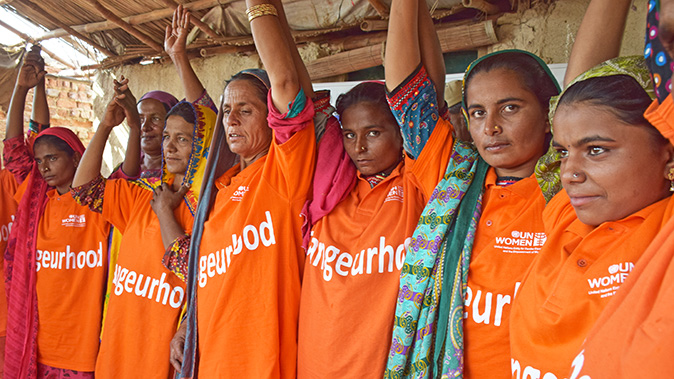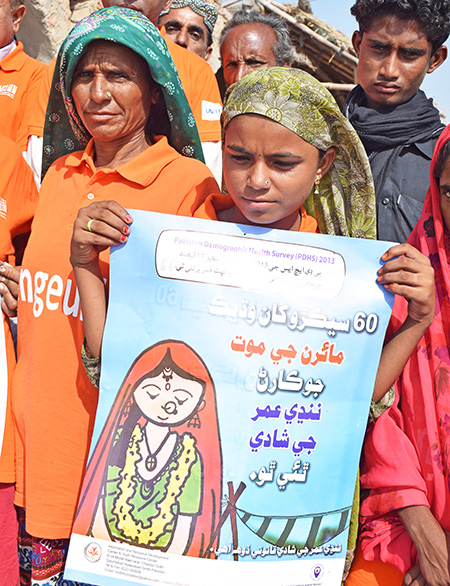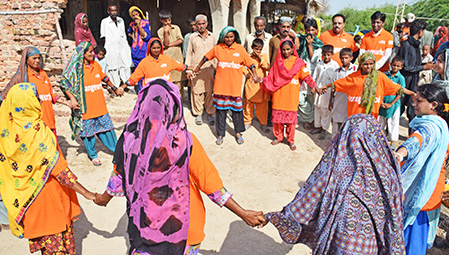Women in Sindh put focus on food insecurity and ending child marriages
Date:
Author: Henriette Bjoerge
Sindh, Pakistan – On Sunday 25th of September, as part of the UN’s Secretary General’s UNITE campaign to End Violence against Women, a group of women came together in the village of Abdullah Chandio in the Tando Muhammad Khan District of Sindh to join hands and raise their voices to put focus on problems of food insecurity and child marriage in their district. This village faced devastating rain floods in 2011 and 2013, which destroyed the crops and shelters.

In Pakistan at least 43 per cent of the population is food insecure with 18 per cent facing a severe food shortage that mostly affect women and children. According to the World Food Programme (WFP), around 15 per cent of the population under the age of five is acutely malnourished. Affected women and growing children are not getting the required level of calories and nutrition, and as much as 43 per cent children face stunted growth, with the highest numbers in Sindh, Balochistan and Fata.
The UNITE campaign has proclaimed the 25th of each month as ‘Orange Day’, and encourages everyone to wear orange to raise awareness and take action to end discrimination and violence against women and girls. This Orange Day, with the theme of the Sustainable Development Goal no 2: End hunger, achieve food security and improved nutrition and promote sustainable agriculture; the UNITE campaign called for eradication of gender-based violence and food insecurity.

The event was organized by the Sindh Community Foundation in cooperation with the United Nations Trust Fund and UN Women, and many participants wore orange to support #OrangeDay. Peasant women residing in Tando Muhammad Khan district, one of the oil-rich districts, described awful tales of food insecurity, and several women told stories of threats of disasters during monsoon season.
Ms. Pathni Chandio spoke of the challenges the communities had faced due to recent floods having destroyed fertile lands, access to water and livelihoods sources. Women have to walk long distances to fetch water, sometimes up to three times a day, in order to meet domestic needs, she said.
Professor Ismail Kumbhar of Sindh Agriculture University in Tandojam, has conducted research in the area and he suggested to have skill development centers for young women so they may have an alternate source of income in addition to farming. Sindh Hari Porhiyat Council President Mr. Punhal Sario encouraged the women to raise their voices in order to find a solution to all their problems.
Mr. Javed Soz, Executive Director of the Sindh Community Foundation, pointed to the lack of basic facilities like health and education, and lack of proper roads, which causes challenges in times of emergency. He further gave several examples in which the practice of early age marriage pushes girls to face health issues, as well as the risk of new-born babies facing malnutrition.
Ms. Rehana Khushk, Ms Ayesha Durani and Mr.Peer Bux Chandio also spoke on the occasion.

The women gathered to share what they had learned after attending awareness sessions about avoiding early marriage of girls, and they also discussed the impact food insecurity and malnutrition have on their lives. The activity created awareness around the issues of access to food and early marriages, and as a result the participants at the #OrangeDay event vowed to advocate against early marriage of the girls in their community.
For more information:
Please contact: Henriette Bjoerge
Communications and Advocacy Officer, UN Women Pakistan.
E-mail: [ Click to reveal ]